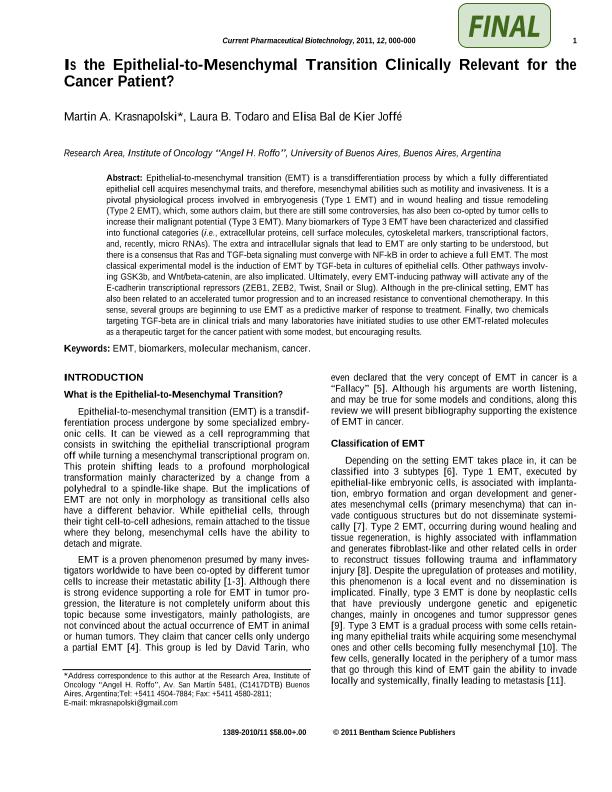Artículo
Is the Epithelial-to-Mesenchymal Transition Clinically Relevant for the Cancer Patient?
Fecha de publicación:
04/2011
Editorial:
Bentham Science Publishers
Revista:
Current Pharmaceutical Biotechnology
ISSN:
1389-2010
Idioma:
Inglés
Tipo de recurso:
Artículo publicado
Clasificación temática:
Resumen
Abstract: Epithelial-to-mesenchymal transition (EMT) is a transdifferentiation process by which a fully differentiated epithelial cell acquires mesenchymal traits, and therefore, mesenchymal abilities such as motility and invasiveness. It is a pivotal physiological process involved in embryogenesis (Type 1 EMT) and in wound healing and tissue remodeling (Type 2 EMT), which, some authors claim, but there are still some controversies, has also been co-opted by tumor cells to increase their malignant potential (Type 3 EMT). Many biomarkers of Type 3 EMT have been characterized and classified into functional categories (i.e., extracellular proteins, cell surface molecules, cytoskeletal markers, transcriptional factors, and, recently, micro RNAs). The extra and intracellular signals that lead to EMT are only starting to be understood, but there is a consensus that Ras and TGF-beta signaling must converge with NF-kB in order to achieve a full EMT. The most classical experimental model is the induction of EMT by TGF-beta in cultures of epithelial cells. Other pathways involving GSK3b, and Wnt/beta-catenin, are also implicated. Ultimately, every EMT-inducing pathway will activate any of the E-cadherin transcriptional repressors (ZEB1, ZEB2, Twist, Snail or Slug). Although in the pre-clinical setting, EMT has also been related to an accelerated tumor progression and to an increased resistance to conventional chemotherapy. In this sense, several groups are beginning to use EMT as a predictive marker of response to treatment. Finally, two chemicals targeting TGF-beta are in clinical trials and many laboratories have initiated studies to use other EMT-related molecules as a therapeutic target for the cancer patient with some modest, but encouraging results.
Palabras clave:
Emt
,
Biomarkers,
,
Molecular Mechanism
,
Cancer.
Archivos asociados
Licencia
Identificadores
Colecciones
Articulos(OCA HOUSSAY)
Articulos de OFICINA DE COORDINACION ADMINISTRATIVA HOUSSAY
Articulos de OFICINA DE COORDINACION ADMINISTRATIVA HOUSSAY
Citación
Krasnapolski, Martin Alejandro; Todaro, Laura Beatriz; Bal, Elisa Dora; Is the Epithelial-to-Mesenchymal Transition Clinically Relevant for the Cancer Patient?; Bentham Science Publishers; Current Pharmaceutical Biotechnology; 12; 11; 4-2011; 1891-1899
Compartir
Altmétricas




